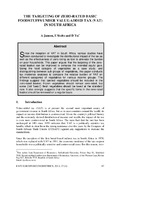| dc.contributor.author | Jansen, A. | |
| dc.contributor.author | Stoltz, E. | |
| dc.contributor.author | Yu, Derek | |
| dc.date.accessioned | 2015-02-18T12:05:37Z | |
| dc.date.available | 2015-02-18T12:05:37Z | |
| dc.date.issued | 2013 | |
| dc.identifier.citation | Jansen, A. et al. (2013). The targeting of zero-rated basic foodstuffs under value-added tax (VAT) in South Africa. Studies in Economics and Econometrics, 37 (3): 87-104 | en_US |
| dc.identifier.issn | 0379-6205 | |
| dc.identifier.uri | http://hdl.handle.net/10566/1352 | |
| dc.description.abstract | Since the inception of VAT in South Africa, various studies have been conducted to investigate the distributional impact of the tax as well as the effectiveness of zero-rating as tool to alleviate the burden on poor households. This paper argues that the targeting of the zero-rated basket can be improved to enhance the intended equity gain. Using the food category of vegetables as a case study, and distinguishing between sub-groups of vegetables, this paper conducts tax incidence analyses to compare the relative burden of VAT on different categories of vegetables for various income groups. The findings suggest that canned vegetables should be included in the zero-rated basket, frozen vegetables should remain zero-rated, but some (not ‘basic’) fresh vegetables should be taxed at the standard rate. It also strongly suggests that the specific items in the zero-rated basket should be reviewed on a regular basis. | en_US |
| dc.language.iso | en | en_US |
| dc.publisher | Bureau for Economic Research (BER) | en_US |
| dc.subject | VAT | en_US |
| dc.subject | Zero-rated foodstuffs | en_US |
| dc.subject | South Africa | en_US |
| dc.title | The targeting of zero-rated basic foodstuffs under value-added tax (VAT) in South Africa | en_US |
| dc.type | Article | en_US |
| dc.privacy.showsubmitter | false | |
| dc.status.ispeerreviewed | true | |
| dc.description.accreditation | Department of HE and Training approved list | en_US |

